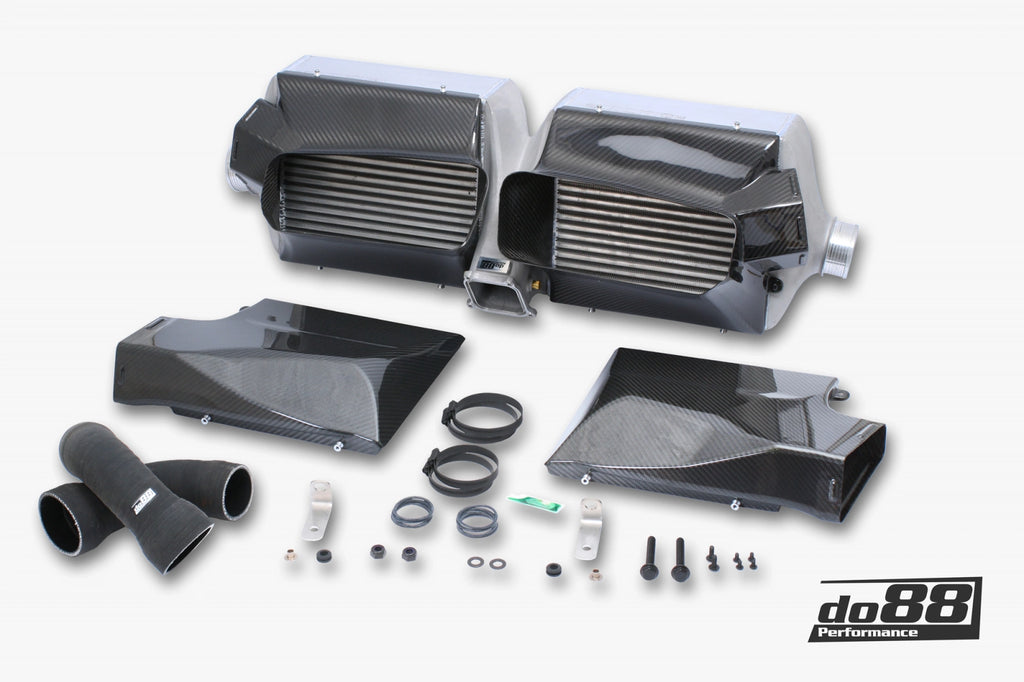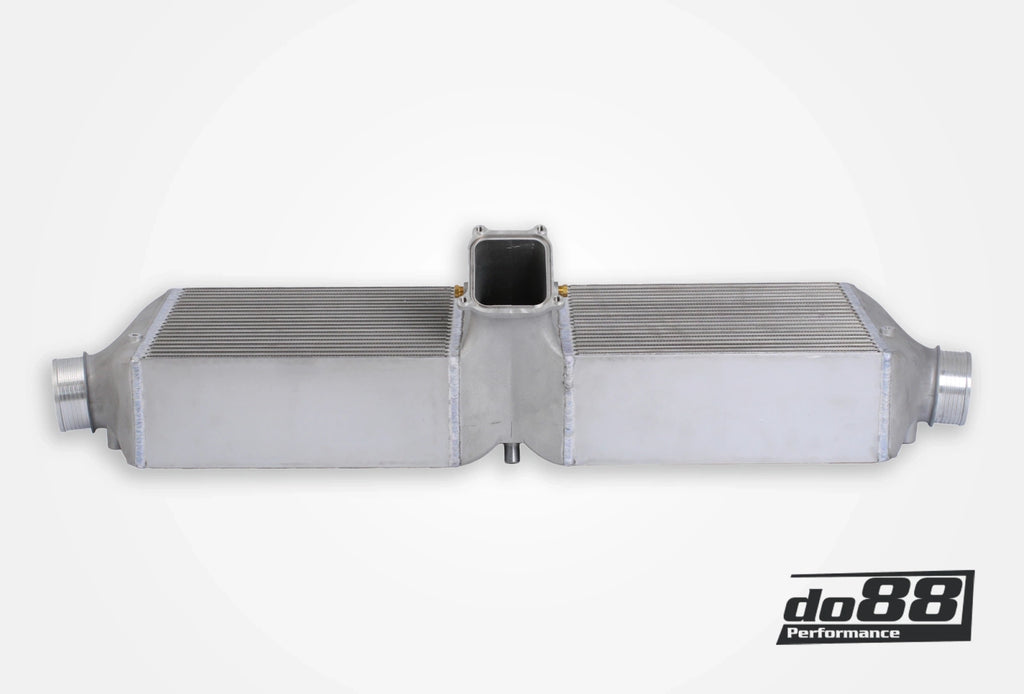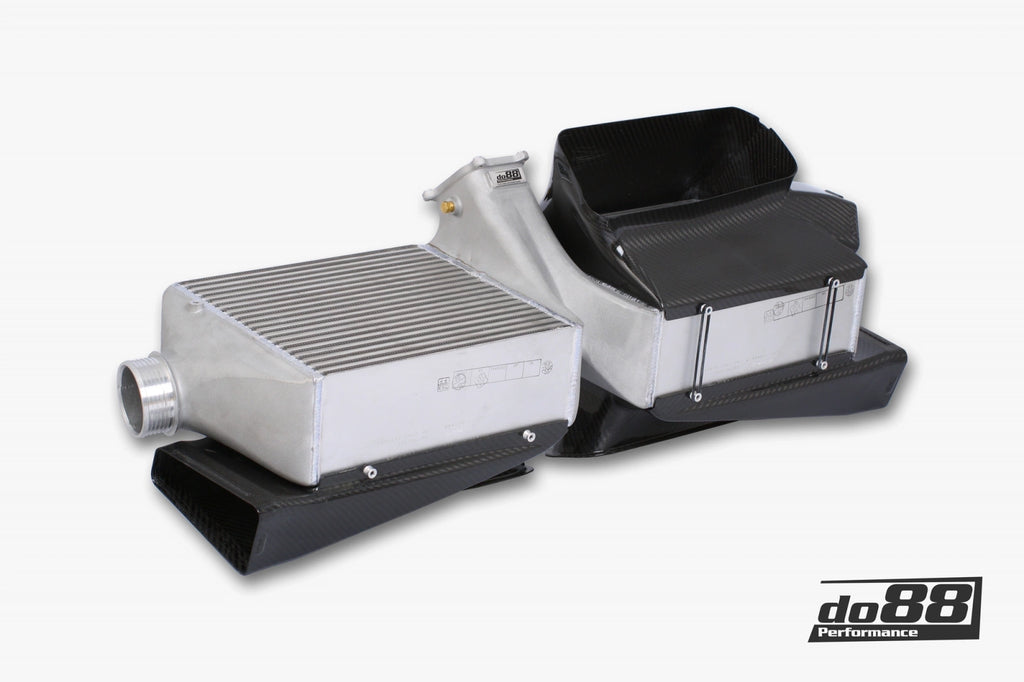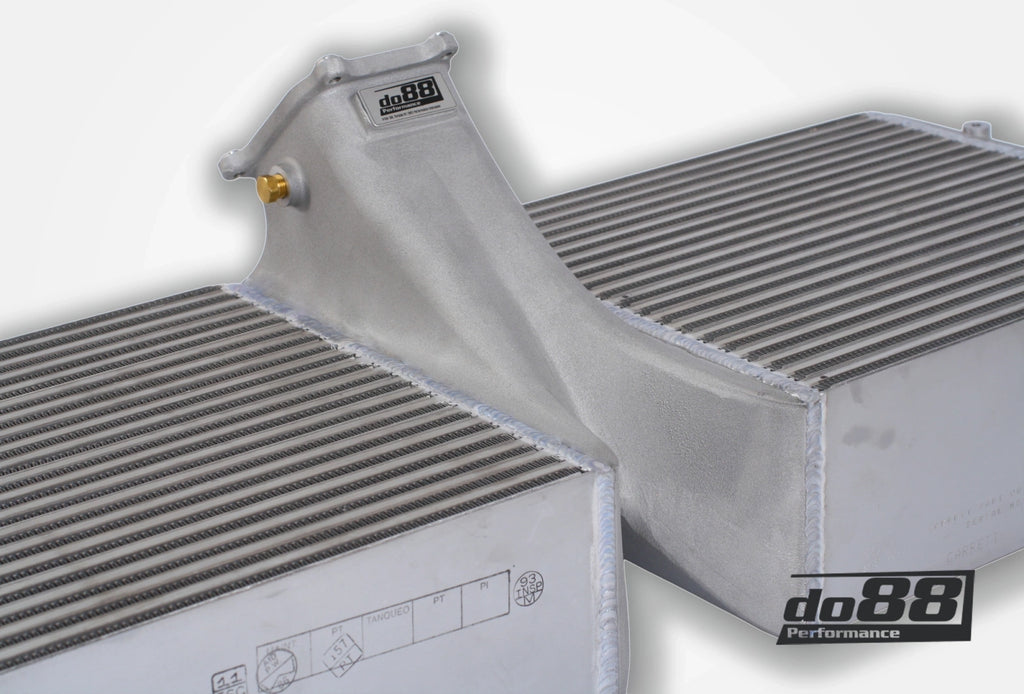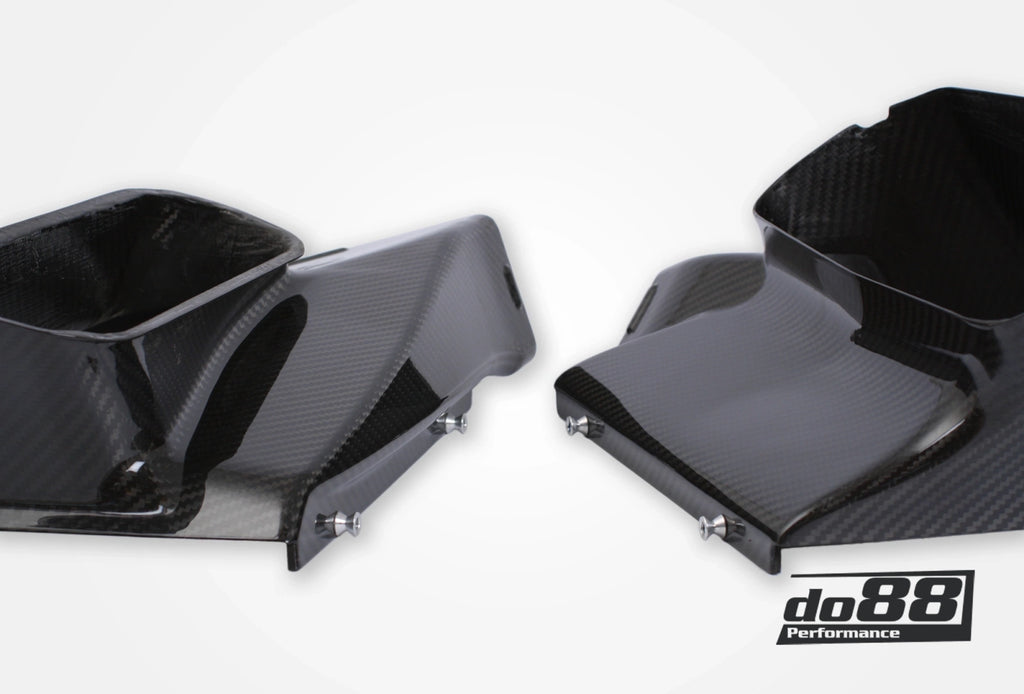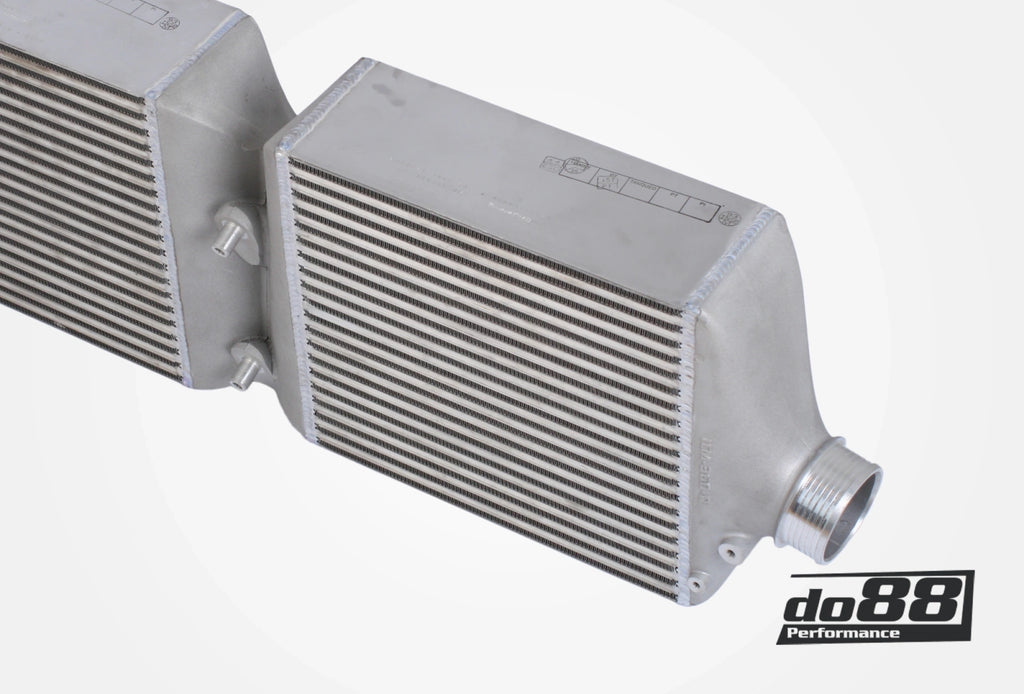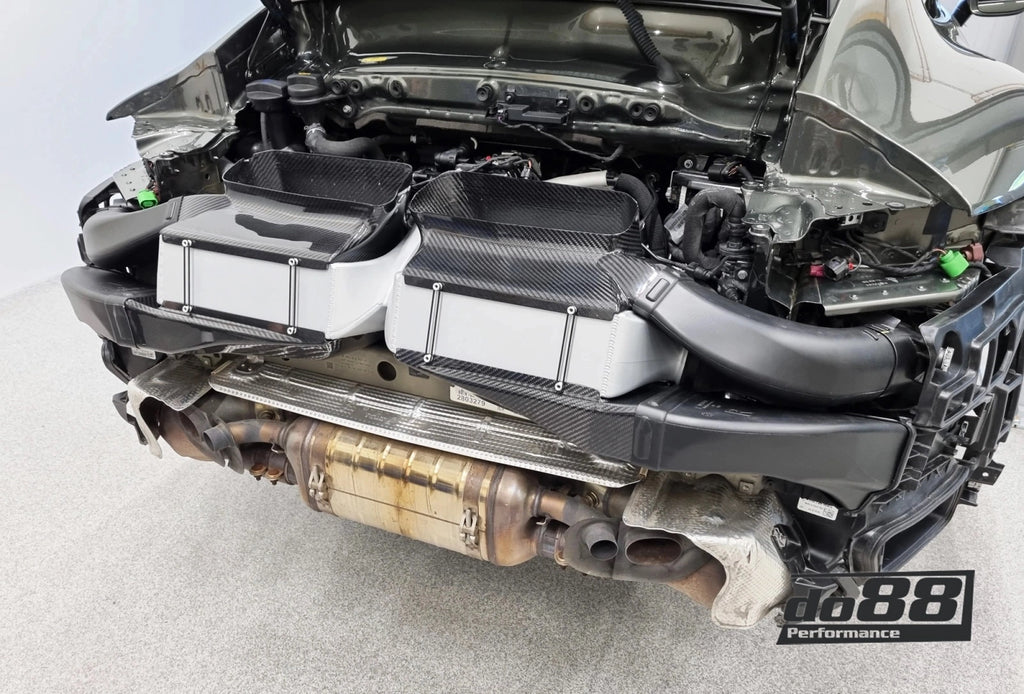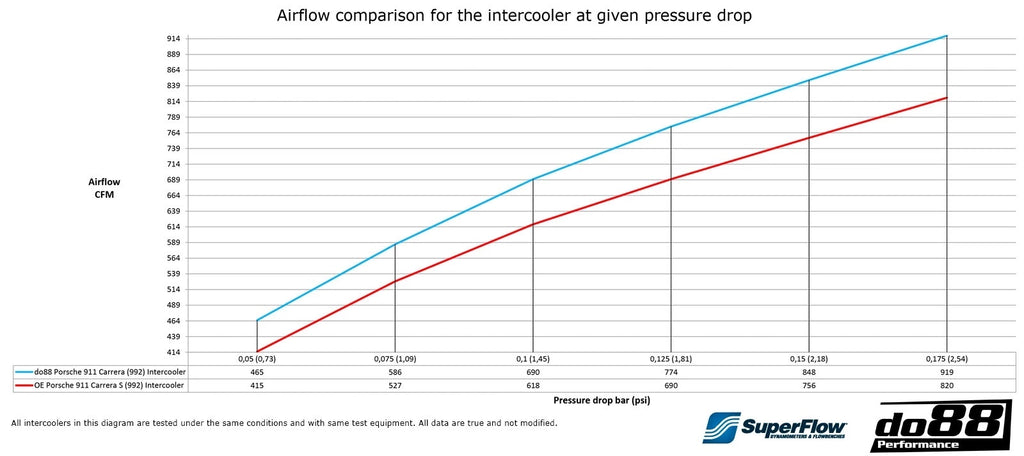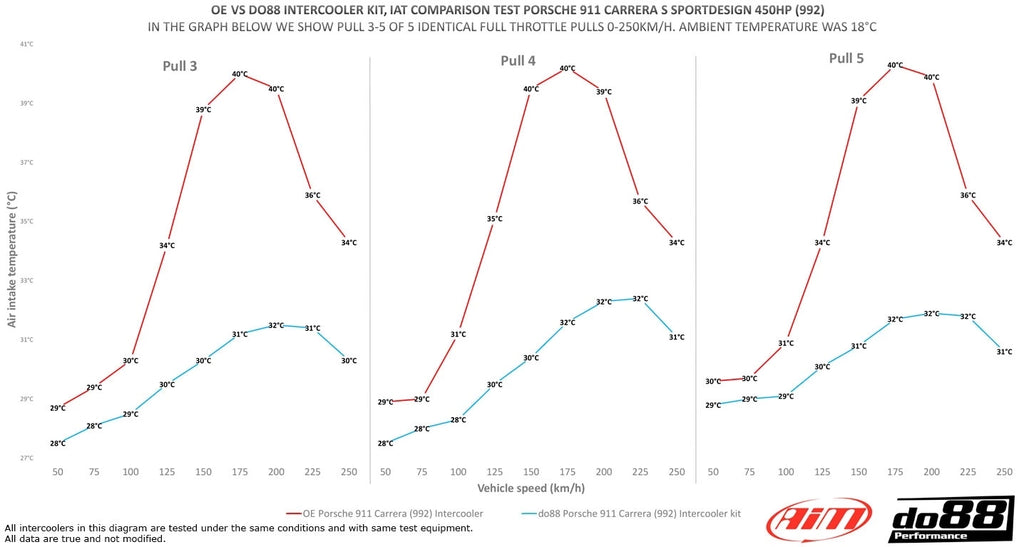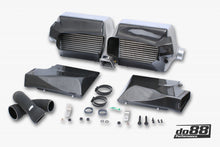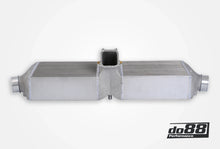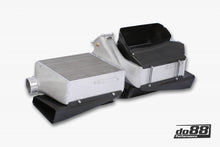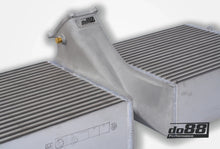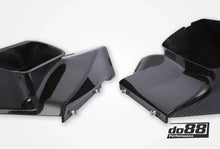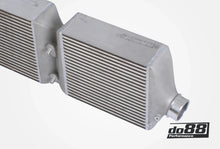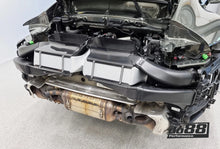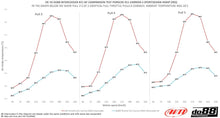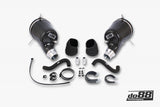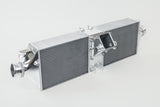A true performance upgrade for the 911 Carrera, -S, -GTS!
The world´s first complete 992 intercooler package. This is our most complex product ever!
If you ask us, this is as good as you can make an intercooler kit for this platform. No rock has been left unturned in our quest for maximum performance in any given section of the system. The starting point is the cores from renowned Garrett Motorsport, these are incredibly well-made with thin and stacked fins, exactly according to our specification in the weighing of cooling and airflow. The end tanks are made from thin, cast aluminum to keep the weight down and still utilize airflow. To accommodate the thicker core, we replace the air guides with carbon ducts made from the best quality! And to remove bottlenecks throughout the system, the intercooler connections are made bigger and come along with do88 silicone hoses designed with soft, sweeping bends. We have not made any sacrifice or compromise during this development – behold the results!
Key figures:
- Colder inlet air temperature in the same conditions: 30°C / 86 F (39°C / 102,2 F), 9°C / (16,2 F) lower!
- More air to your engine, less backpressure and better airflow!
- Airflow at 0,175 bar / 2,54 psi pressure drop: 919 CFM (820 CFM), 12% higher!
- High-density, motorsport-grade Bar&Plate cores from Garrett
- 3D, freeform-designed cast end tanks
- Custom designed carbon fiber ambient air guides
- Comes with high quality silicone hoses and accessories for installation
- Meth bungs on the intercooler outlet tank (2x 1/8 NPT)
Background:
Upon launching the 992 generation, Porsche had already abandoned the naturally aspirated engine. From now on, all 911´s are turbocharged which makes this entry-level legend interesting also for the ones aiming for those bigger HP-numbers. Each car model comes with its own challenges and preconditions. While the principle is the same as ever, the layout of the intercooler system is something entirely new on this platform compared to previous Porsche 911´s. With our knowledge and experience from previous developments, we sat down by the drawing board with equal shares of confidence and respect. As a pioneer on this new platform on the market we realized we had to be very accurate and forward-thinking. Today we are proud of our achievements for the 992!
Earlier versions of the Porsche 911 have their intercoolers inside each rear fender, with a y-pipe uniting them both before the charge air reaches the inlet manifold. The 992 has a different set-up entirely. The intercooler and y-pipe are now combined to a unit that sits beneath the rear wing. The ambient air is pushed via channels from the rear window, into a scoop on the decklid, and onwards through the intercooler core for optimal heat transfer. The active rear wing is crucial for the efficiency of the core as it directs more air in its upright position. Looking at the construction from the side, this configuration really makes more sense, but is also more demanding for us a performance cooling manufacturer. To be able to fit a core with greater volume and surface area, we had to develop new carbon ducts to allow the increase in thickness. We are very happy to have taken our carbon production to the next level with this product - the fitment and finish worthy of an icon as the 911!
Cores from Garrett:
The cores are Bar&Plate, made by renowned Garrett Motorsport. Quite frankly, they are as good as they get. Thin and stacked cooling fins give a dense construction, providing very efficient heat transfer. The core measures 105 mm (4”) and are exactly as thick as you possibly can make them for this application. The air is distributed to the entire core via free form-designed, cast end tanks. Designing these was a significant undertaking that concluded 3D-scanning, CFD-analysis and 3D-printing many times over until we had a finished prototype. We chose, as usual, to use cast end tanks as they allow shapes that CNC-machining cannot replicate, and to us function always conquers form. Maximum airflow supersedes the bling factor! The tanks are made with machined 70 mm (2,75”) connections to enable high outputs. To pair with these bigger connections, we also include silicone hoses. Both cores are united by a central outlet tank towards the inlet manifold, utilizing machined connections and meth bungs.
Ambient air guides made from carbon:
The air guides are made from vacuum infused, prepreg carbon and all pieces come with fastening grooves for the air channels just like the OE bits. As complex as the shapes are, we still guarantee perfect fitment! The two upper air guides are always the same regardless of what car you have, but for the two lower pieces there is an option: Standard or SportDesign. SportDesign has better evacuation of the cooling air via an outlet in the middle of the bumper. From a performance standpoint, SportDesign is preferred, but we offer carbon ducts for both versions. They come with proper rubber seals where this is needed to prevent the cooling air to escape pass the core.
Performance:
When it comes down to performance, the do88 intercoolers significantly reduce the intake temperature! In the graph found in the extra pictures the difference towards the OE 992 units is presented. The data is collected with an AIM race logger under 5 consecutive runs in an immediate sequence on a closed airstrip. Full throttle accelerations between 50-250 km/h (30-155 mph) carried out in a Porsche 911 Carrera S (450 hp). Hard braking, no cooldown in between, just full pull five times. The rear wing was in its upper position all the time.
The test was conducted in the following manner:
Firstly, 5 runs were made with the car equipped with the 992 OE intercoolers. Stop, fast change of parts to the do88 intercoolers. Shakedown for a few minutes and then five runs made in the exact same way as with the OE parts. The decrease in inlet air temperature is significant, peak delta is 9°C (16,2 F). See the graph found in the extra pictures!
Cooling is important, and so is airflow. After many hours in the development, refining the end tanks and choosing a core to meet our demand, the result is an intercooler that is much more efficient in terms of heat transfer as well as airflow. Using our in-house flowbench, Superflow SF-1020 Probench, the airflow is verified for both the do88 intercoolers and the OE 992 units. What you see is what you get – true performance!

